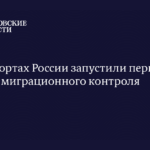The names of 61 finalists in the national track of the fifth season of the #WeTogether award, as well as 29 in the international track, have been determined.
“The organizing committee of the international #WeTogether award has summarized the results of the expert evaluation and announced the names of 61 finalists in the national track of the award’s fifth season and 29 in the international track,” the statement said.
The Deputy Prime Minister noted that every year the award brings together tens of thousands of volunteers from Russia and foreign countries.
“This season, the finalists include representatives from 31 regions of Russia and 23 foreign countries, including Morocco, Kenya, Nigeria, Bangladesh, and Kazakhstan. The largest numbers come from Krasnoyarsk Krai, Khanty-Mansi Autonomous Okrug – Yugra, Moscow, and Moscow Region. I thank all participants for their responsiveness, resilience, and hard work, and congratulate the finalists on their well-deserved results!” the official said.
The names of the laureates will be announced at the end of November, and the official award ceremony for the winners will take place as part of the International Forum of Civil Participation #WeTogether from December 2 to 5 in Moscow.
Moscow
Moscow is the capital and largest city of Russia, with a history dating back over 800 years to its founding in 1147. It has served as the political and cultural heart of the Russian state for much of its history, symbolized by iconic sites like the Kremlin and Red Square. These landmarks reflect its significance through various eras, including the Tsardom, the Soviet Union, and the modern Russian Federation.
Moscow Region
The Moscow Region is a federal subject of Russia surrounding the national capital of Moscow, though the city itself is a separate entity. Historically, this area has been the heart of the Russian state for centuries, dotted with ancient towns, former noble estates, and fortified monasteries that played a crucial role in defending the approaches to Moscow. Today, it is a major economic and cultural hub, known for its scientific cities, historic landmarks like the Trinity Lavra of St. Sergius in Sergiev Posad, and its picturesque countryside.
Krasnoyarsk Krai
Krasnoyarsk Krai is a vast federal subject in Siberia, Russia, known for its immense natural resources and dramatic landscapes, including the Siberian taiga and the Putorana Plateau. Historically, its development was spurred by Russian expansion into Siberia and the construction of the Trans-Siberian Railway, and it later became a significant center for industry and a site for Soviet-era labor camps (the Gulag system). Today, it is a major economic region, crucial for its mining, hydroelectric power, and the famous Stolby Nature Reserve near the city of Krasnoyarsk.
Khanty-Mansi Autonomous Okrug – Yugra
The Khanty-Mansi Autonomous Okrug – Yugra is a vast, oil-rich region in western Siberia, Russia. Historically, it is the ancestral homeland of the Khanty and Mansi peoples, indigenous Uralic groups with a traditional culture of reindeer herding, hunting, and fishing. Its modern history has been defined by the discovery of massive petroleum reserves in the 1960s, transforming it into one of the world’s most important energy-producing areas.
Morocco
Morocco is a North African country with a rich history shaped by indigenous Amazigh (Berber) cultures, Arab influence since the 7th century, and historical interactions with European and other civilizations. It is renowned for its imperial cities—such as Fez, Marrakech, Meknes, and Rabat—which feature ancient medinas, palaces, and mosques that reflect its diverse architectural and cultural heritage. Today, Morocco is known for its vibrant traditions, intricate crafts, and unique blend of Arab, African, and Mediterranean influences.
Kenya
Kenya is an East African nation renowned for its diverse landscapes, ranging from the Great Rift Valley and savannahs to pristine Indian Ocean coastlines. Its history includes being a hub for ancient trade routes, a former British colony that gained independence in 1963, and the cradle of the Swahili culture and language along the coast. Today, it is globally famous for its wildlife reserves and the Maasai Mara, which hosts the spectacular annual wildebeest migration.
Nigeria
Nigeria is a diverse West African country known for its rich cultural heritage, including ancient kingdoms like the Nok, Benin, and Oyo empires. It gained independence from British colonial rule in 1960 and is now Africa’s most populous nation and largest economy, famous for its vibrant music, film industry (Nollywood), and artistic traditions.
Bangladesh
Bangladesh is a South Asian country formed in 1971 after a war of independence from Pakistan. Its history is deeply rooted in the Bengal region, with a rich cultural heritage spanning ancient kingdoms, the Mughal Empire, and British colonial rule. The country is renowned for its vibrant arts, numerous rivers, and the world’s largest mangrove forest, the Sundarbans.





